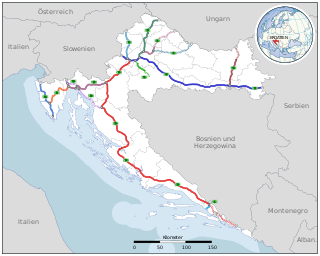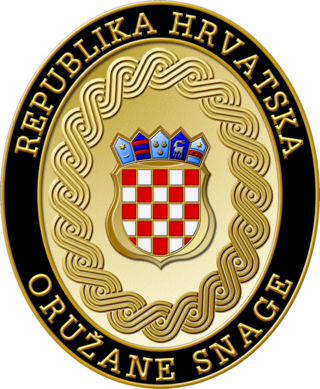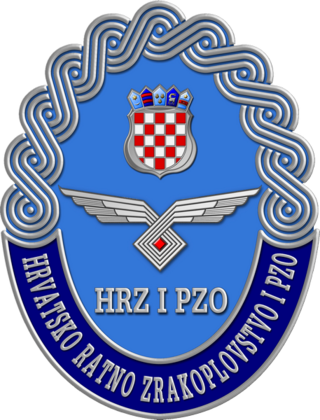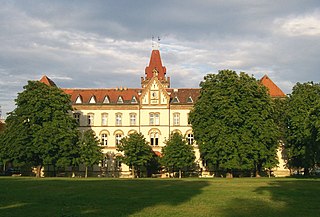
Croatia, officially the Republic of Croatia, is a country in Central and Southeast Europe, on the coast of the Adriatic Sea. It borders Slovenia to the northwest, Hungary to the northeast, Serbia to the east, Bosnia and Herzegovina and Montenegro to the southeast, and shares a maritime border with Italy to the west. Its capital and largest city, Zagreb, forms one of the country's primary subdivisions, with twenty counties. Other major urban centers include Split, Rijeka and Osijek. The country spans 56,594 square kilometres, and has a population of nearly 3.9 million.

Transport in Croatia relies on several main modes, including transport by car, train, ship and plane. Road transport incorporates a comprehensive network of state, county and local routes augmented by a network of highways for long-distance travelling. Water transport can be divided into sea, based on the ports of Rijeka, Ploče, Split and Zadar, and river transport, based on Sava, Danube and, to a lesser extent, Drava. Croatia has 9 international airports and several airlines, of which the most notable are Croatia Airlines and Trade Air. Rail network is fairly developed but regarding inter-city transport, bus tends to be far more common than the rail.

The Armed Forces of the Republic of Croatia are the military forces of the Republic of Croatia.

Hrvatska radiotelevizija, or Croatian Radiotelevision, is a Croatian public broadcasting company. It operates several radio and television channels, over a domestic transmitter network as well as satellite. HRT is divided into three joint companies – Croatian Radio, Croatian Television and Music Production, which includes three orchestras and a choir.

The Croatian Air Force is the air force of the Croatian Armed Forces. It is tasked primarily with safeguarding the sovereignty of Croatian airspace and providing aviation support to other branches during joint operations. Prior to a 2018 decision by the Croatian Parliament, the HRZ was responsible for the integrated air defense system of Croatia. However, Air Defense (PZO) was subsequently transferred to the Croatian Army.

Croatia recognizes life partnerships for same-sex couples through the Life Partnership Act, making same-sex couples equal to married couples in almost all of its aspects. The Act also recognizes and defines unregistered same-sex relationships as informal life partners, thus making them equal to registered life partnerships after they have been cohabiting for a minimum of 3 years. Croatia first recognized same-sex couples in 2003 through a law on unregistered same-sex unions, which was later replaced by the Life Partnership Act. The Croatian Parliament passed the new law on 15 July 2014, taking effect in two stages. Following a 2013 referendum, the Constitution of Croatia has limited marriage to opposite-sex couples.

Kralj Petar Krešimir IV is a Kralj-class missile boat in service with the Croatian Navy. It was laid down in 1990 at the Kraljevica Shipyard as the first ship in a new class being built for the Yugoslav Navy. As the Croatian War of Independence started gaining momentum, shipyard workers stalled the completion of the ship until the remaining Yugoslav forces retreated, preserving the ship for the Croatian Navy that was being formed.

Zagreb Franjo Tuđman Airport or Zagreb Airport is an international airport serving Zagreb, Croatia. It is the largest and busiest airport in Croatia. In 2023 it handled 3.72 million passengers and some 10,859 tons of cargo.

Osijek Airport, commonly referred to as Klisa is the international airport of Osijek, Croatia. It is located 20 km east southeast of Osijek and near the D2 state road, southwest of the village of Klisa.
Croatian News Agency is the government-owned national news agency of Croatia. It was established on 26 July 1990. The agency is based at Marko Marulić Square in the Lower Town neighbourhood in central Zagreb.
The core of the security and intelligence system of the Republic of Croatia consists of two security and intelligence agencies:

Lošinj Airport is a privately owned public airport 3.2 nautical miles (5.9 km) from Mali Lošinj on the island of Lošinj, Croatia. It is registered for domestic and international traffic.

The Security and Intelligence Agency is the Croatian security and intelligence service founded in 2006 upon the passing of the Security and Intelligence System of the Republic of Croatia Act and by combining the former Counterintelligence Agency (POA), and the Intelligence Agency (OA) which both ceased to operate.
This article details the history of the Croatian Air Force. The Republic of Croatia is a unitary democratic parliamentary republic in Europe at the crossroads of Central Europe, the Mediterranean, and the Southeast Europe. Its capital and largest city is Zagreb. The modern Croatian Air Force was established on 12 December 1991, during the Croatian War of Independence.

The ministry of Construction, Spatial Planning and State Property of the Republic of Croatia is the ministry in the Government of Croatia which is in charge of construction.
Božo Skoko is a professor of public relations at the Faculty of Political Science, University of Zagreb. He is Head of the Public Relations postgraduate specialist programme at the University of Zagreb. The areas of his scientific research include: public relations, communication, international relations, national identity and image and branding destination. He is a guest professor at the University of Osijek (Croatia), University of Mostar and Edward Bernays University College, Zagreb. He has published seven books pertaining to public relations, to branding countries, and to the identity and image of Croatia. He is one of the founders and partner in Millenium promocija, leading communications management agency in Croatia. Skoko has a doctor's degree from the Faculty of Political Science, University of Zagreb. As a consultant he was worked with numerous Croatian and international corporations, political institutions and non-governmental organizations.
The Republic of Croatia Directorate General for Civil Aviation was a government agency of Croatia, headquartered in Zagreb. It manages aspects of civil aviation in Croatia.
Civil Aviation Agency Slovenia is the civil aviation authority in Slovenia. Its head office is in Ljubljana.

The Vrsar Crljenka Airport is an airport for general aviation in Croatia. It is located about 2 km southeast of Vrsar.

On 10 March 2022 at 23:01 CET, an unidentified Soviet-made Tupolev Tu-141 reconnaissance unmanned aerial vehicle (UAV) crashed in Zagreb, the capital of Croatia. With an unidentified operator and unknown destination, the origin of the drone is presumed to be connected to military actions during the Russian invasion of Ukraine. The drone's flight over Croatia, Hungary and Romania prompted criticism of the countries' defense systems as the UAV was detected but not cleared. In response, the Croatian government restricted airspace over populous cities and received military support from France and the United States who dispatched multiple fighter-jets to Croatia days later for joint exercises.














